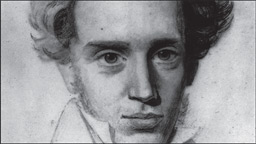Be wary of modern-day passion
 A serious student of philosophy at times feels that there is
something fundamentally important is missing from most of the
philosophies he has studied. Philosophers down the ages have defined
philosophy in many ways. They have formulated various theories to solve
problems we face. But only a few of them have attempted to answer the
most difficult questions: What does my life mean? Who am I? What am I to
do? A serious student of philosophy at times feels that there is
something fundamentally important is missing from most of the
philosophies he has studied. Philosophers down the ages have defined
philosophy in many ways. They have formulated various theories to solve
problems we face. But only a few of them have attempted to answer the
most difficult questions: What does my life mean? Who am I? What am I to
do?
Some philosophers such as Thomas Aquinas tried to prove the existence
of God. Others such as Karl Marx did not believe in the existence of
God. How does the existence or non-existence of God affect human life?
After the Industrial Revolution the problems of the people became more
and more complex. They simply had no time or the inclination to debate
over ethical issues such as what is good and bad. Their main concern was
how to exist in a fast changing world.
It is at this stage existentialists tried to find answers to such
problems. When people were losing their individuality to become cogs in
a big wheel, human freedom and dignity had to be sacrificed. When to God
of Mammon began to rule the world, the rich and the powerful showed no
regard to ordinary people who were mostly factory workers or farmers.
Philosopher Samuel Enoch Stumpf said, “Existentialism was bound to
happen. The individual had over the centuries been pushed into the
background by systems of thought, historical events and technological
forces.”
Technology
When people were turning away from Aristotle’s ethics, Nietzsche
said, “...to our scholars strangely enough, the most pressing question
does not occur; to what end is their work useful?” Technology has forced
people to fit their lives into the rhythm of machines. Everywhere people
were being converted to things or objects.”
|

Soren Kierkegaard: How am I to exist? |
Soren Kierkegaard (1813-1855) was the first philosopher who searched
for an authentic existence. He said, “The question is not what am I to
believe, but what am I to do?” His major existential issue was, “How am
I to exist?” He insisted that no amount of objective, systematic and
abstract knowledge could ever provide a meaning for life. He said
objective facts of a life could not account for its existential quality.
Kierkegaard wanted to pass from fragmentation to integration. In his
terms, he also wanted to change his life into an existence with a focus
and centre. However, it is doubtful whether this could be achieved in
the modern age. Today we are governed by well-organised institutions,
technological innovations and scientific inventions. As a result, we
never see an existing individual in the modern society.
Mediocrity
Kierkegaard viewed the mid-19th century as an era of passionless
mediocrity and conformity. According to him, there is a diminution of
the individual’s role in the face of mass production and mass media. He
saw how people venerate science and technology forgetting their own
individuality. In a hard-hitting piece of writing he said, “Let others
complain that the age is wicked; my complaint is that it is wretched,
for it lacks passion.”
After more than a century of his death, modern philosophers question
whether Kierkegaard was correct. Whether he was right or wrong,
Kierkegaard addressed one of the crucial issues of our time: “ How can
we be our ‘true selves’ in an age dominated by sophisticated ways of
influencing our thoughts, feelings and actions? While living in a world
seduced by conformity, have we not lost our passion for living?”
Passionate thinkers
Kierkegaard considered passion to be a major factor in life. For him
all the major Greek philosophers - Socrates, Plato and Aristotle - were
passionate thinkers. What we mean by existence is different from his
thinking. When we go about our day-to-day business it is not real
existence. It is only a half-conscious existence because we conform to
conventions. His existentialism is meant to change our attitudes and
edify us. Kierkegaard’s philosophy is deliberately passionate, practical
and existential, in the fullest sense of the word.
In the final analysis, few other philosophers have dealt with certain
important problems of our times as Kierkegaard has done. Today most of
us enjoy our leisure-time activities and lead a sophisticated lifestyle.
However, we lack authenticity in all walks of life. Modern philosophers
have pointed out that lack of passion is deadly but the presence of
passion is no guarantee of authenticity.
The biggest danger today is not the lack of passion or too much of it
but resentment and envy masquerading as passion. Whatever is said to the
contrary, Kierkegaard’s question haunts us even today: “What are we to
do?”
|

